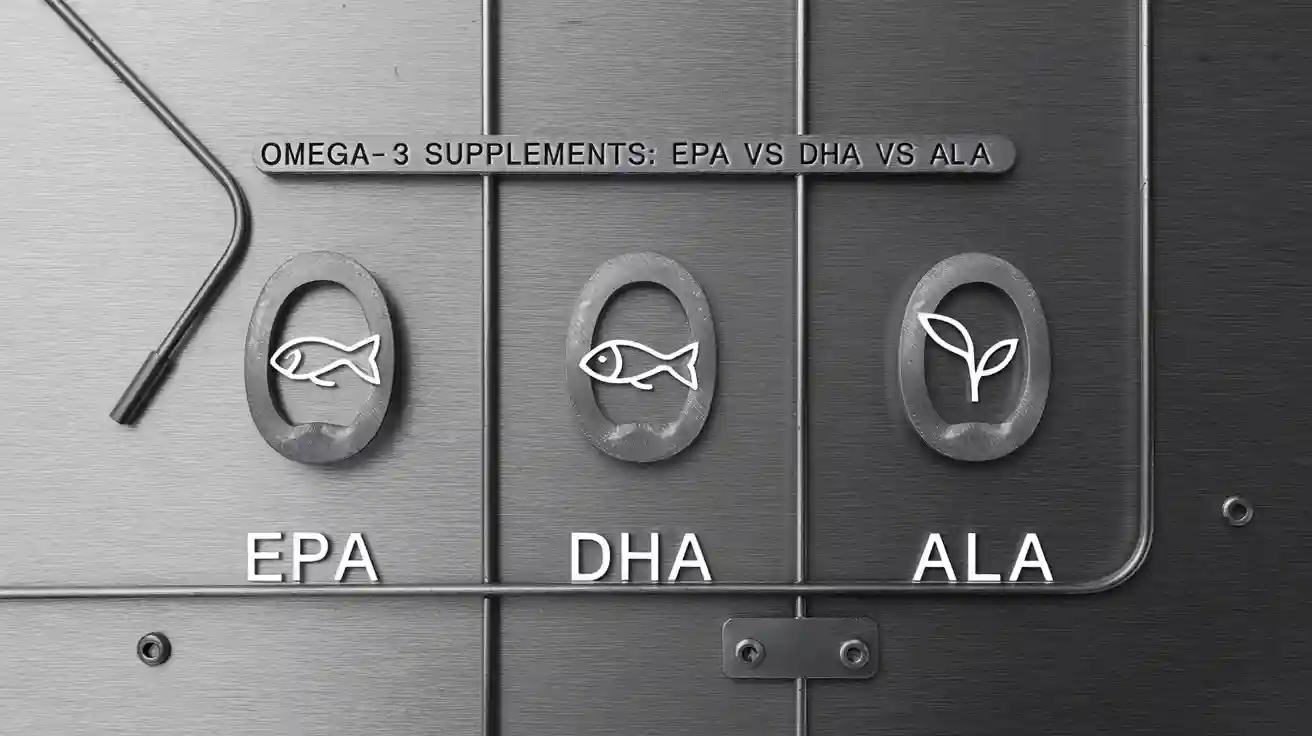
Have you ever stood in the supplement aisle, confused by the different omega-3 types on the labels? You are not alone. Most experts agree that EPA and DHA offer the greatest health benefits because your body absorbs them better than ALA. Studies show that ALA from plants converts poorly—only about 8% becomes EPA and just 1% becomes DHA. Since marine sources like fish oil and krill oil provide EPA and DHA directly, you get more impact for your health. Always think about your health goals and dietary habits before choosing omega-3 supplements.
Note: DHA leads the market, making up over 62% of global omega-3 sales, and marine sources remain the top choice for most people.
Key Takeaways
EPA and DHA from marine sources offer the strongest health benefits because your body absorbs them better than ALA from plants.
Your body converts ALA to EPA and DHA very poorly, so relying only on plant-based omega-3s may not meet your needs.
Eating fatty fish twice a week or taking high-quality supplements helps you get enough EPA and DHA for heart and brain health.
EPA supports heart health by reducing inflammation and lowering the risk of major heart events.
DHA is essential for brain and eye development, especially during pregnancy and early childhood.
When choosing omega-3 supplements, always check the label for clear EPA and DHA amounts and prefer products with third-party quality certifications.
Algal oil is a sustainable, plant-based source of EPA and DHA that works well for vegetarians and vegans.
Balance your omega-3 intake with omega-6 and omega-9 fats to support overall health and reduce inflammation.
Omega-3 Fatty Acids
Overview
You encounter omega-3 fatty acids every time you read about nutrition or heart health. These essential fatty acids belong to the polyunsaturated fat family. Their chemical structure sets them apart from other fats. Omega-3 fatty acids have multiple cis double bonds, with the first double bond located three carbons from the omega (methyl) end of the chain. This unique structure causes bends in the molecule, which affects how they work in your body.
Take a look at the main types of omega-3 fatty acids and how they compare to other fatty acids:
Name | Abbreviation | Carbon Chain Length and Double Bonds | Omega Position | |
|---|---|---|---|---|
Omega-3 | Alpha-linolenic acid | ALA | 18 carbons, 3 double bonds | n-3 |
Omega-3 | Eicosapentaenoic acid | EPA | 20 carbons, 5 double bonds | n-3 |
Omega-3 | Docosahexaenoic acid | DHA | 22 carbons, 6 double bonds | n-3 |
Omega-6 | Linoleic acid | LA | 18 carbons, 2 double bonds | n-6 |
Omega-6 | Arachidonic acid | AA | 20 carbons, 4 double bonds | n-6 |
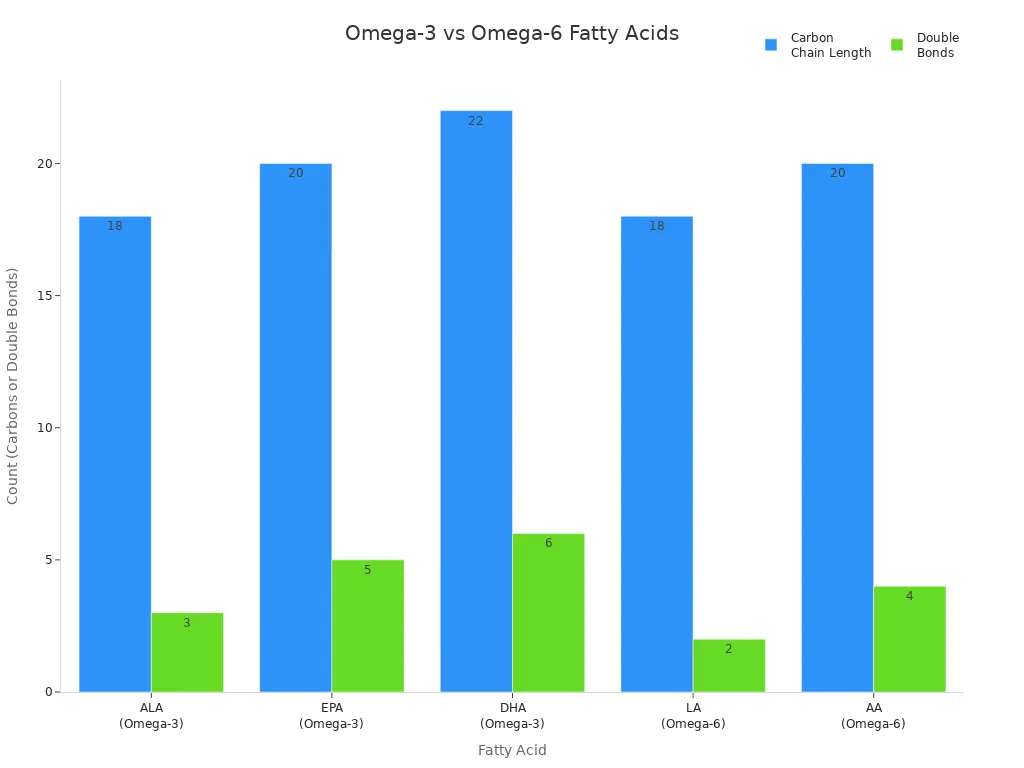
You find omega-3 fatty acids in three main forms: alpha-linolenic acid (ALA), eicosapentaenoic acid (EPA), and docosahexaenoic acid (DHA). Each type has a different chain length and number of double bonds. These structural differences influence their physical properties and biological functions.
Importance
Your body needs omega-3 fatty acids for many vital processes. You cannot make these fats on your own because you lack the enzymes needed to create them. That is why you must get omega-3 fatty acids from your diet. They are true essential fatty acids.
Omega-3 fatty acids help maintain cell membrane integrity and support cell signaling. They play a role in neurological function, blood pressure control, and glucose metabolism. You rely on omega-3 fatty acids to regulate inflammation and support healthy arteries. These fats also serve as building blocks for hormones that control clotting and arterial wall relaxation.
Tip: If you want to support your heart, brain, and overall health, make sure you include sources of omega-3 fatty acids in your meals.
Research shows that omega-3 fatty acids are crucial for brain and eye development, especially in infants. Studies in animals and humans reveal that a lack of omega-3 fatty acids leads to poor brain and retinal growth, lower intelligence, and visual problems. Mothers who consume enough omega-3 fatty acids during pregnancy help their babies develop healthy brains and eyes.
You see the impact of omega-3 fatty acids in populations with high intake. For example, Greenland Eskimos eat large amounts of EPA and DHA from marine sources and have low rates of heart disease. This highlights the importance of total omega-3 fatty acids for long-term health.
If you want to make sure you get enough omega-3 fatty acids, consider adding a high-quality supplement to your routine. You can find trusted options here.
EPA
Eicosapentaenoic acid, often called EPA, stands out as one of the most important omega-3 fatty acids for your body. You find EPA in both marine foods and high-quality supplements. This nutrient supports your heart, helps manage inflammation, and plays a key role in overall health.
Sources
Fish and Seafood
You get the highest amounts of EPA from fatty fish and certain seafood. The American Heart Association recommends eating fish like salmon, sardines, mackerel, herring, and tuna at least twice a week to boost your intake of eicosapentaenoic acid and DHA. These fish provide a rich supply of omega-3s, especially EPA, which your body uses directly.
Fish Type | |
|---|---|
Mackerel | 2.0 grams |
Salmon (farmed) | 1.7 grams |
Herring | 1.3 grams |
Anchovy | 1.2 grams |
Sardines (canned) | 0.8 grams |
Tuna (Bluefin) | 1.0 grams |
You also find EPA in oysters, seabass, and shrimp, though in smaller amounts. Seaweed and algae contain variable levels of eicosapentaenoic acid, making them an option for plant-based diets.
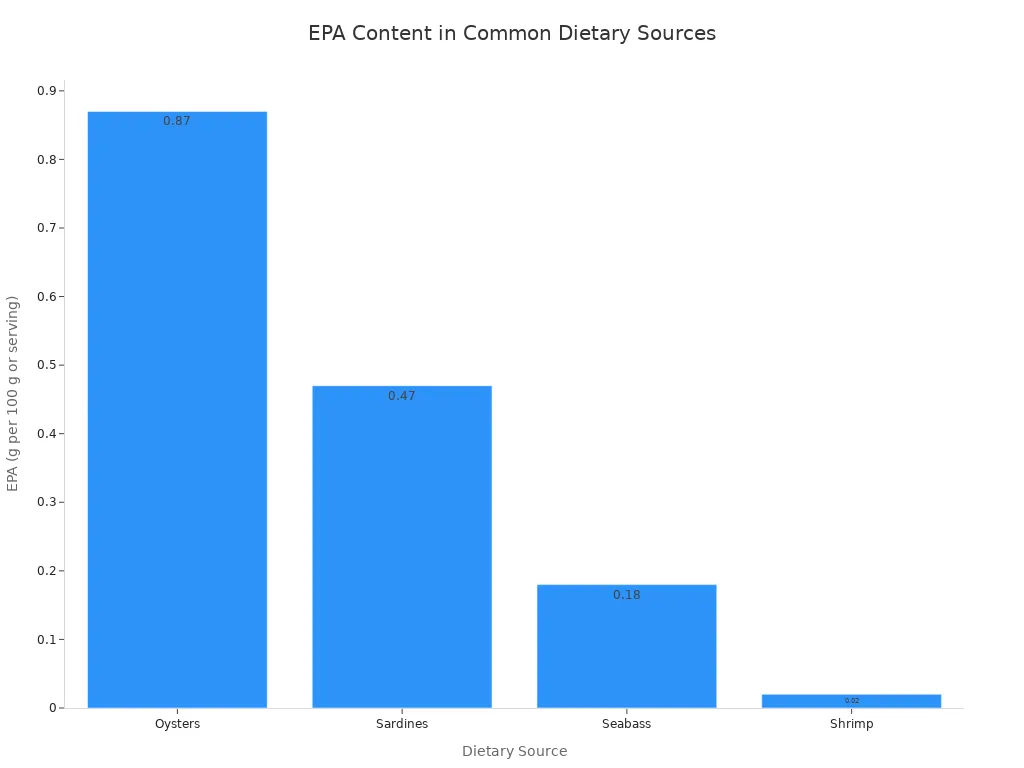
Supplements
If you do not eat enough fish, omega-3 supplements can help you reach your EPA goals. Fish oil and krill oil are the most common supplements that deliver eicosapentaenoic acid in concentrated form. Many people choose these products to support heart health and reduce inflammation. Algal oil supplements also provide EPA, making them suitable for vegetarians and vegans.
Tip: When choosing omega-3 supplements, check the label for EPA content to make sure you get the right amount for your health needs.
Benefits
Anti-Inflammatory
EPA acts as a powerful anti-inflammatory agent in your body. Clinical studies show that eicosapentaenoic acid can lower inflammation by improving blood vessel function and reducing markers like C-reactive protein. For example, research in patients with high cholesterol, diabetes, and heart disease found that EPA supplementation improved blood flow and reduced inflammation. Higher EPA levels in the blood also link to less plaque buildup in arteries, which helps protect your long-term health.
Study/Reference | Patient Population/Condition | Intervention | Outcomes Related to Inflammation |
|---|---|---|---|
Yamakawa et al. (2012) | Hyperlipidemic patients | 3 months EPA supplementation | Improved endothelium-dependent vasodilation, indicating reduced inflammation |
Sasaki et al. (2012) | Diabetic and coronary artery disease patients on statins | EPA plus statins | Further improvement in endothelial function, linked to anti-inflammatory effects |
Kamada et al. (2011) | Japanese hemodialysis patients | High serum EPA levels | Reduced vascular endothelial dysfunction due to anti-inflammatory effects |
Fukumoto et al. (2020) | Patients with mild hypertriglyceridemia | Purified EPA treatment | Reduced triglycerides and enhanced flow-mediated dilation (FMD), associated with inflammation modulation |
Ruscica et al. (2022) | Various clinical studies | High EPA and DHA intake | Reduction in oxidative stress and inflammatory markers such as C-reactive protein and tumor necrosis factor-alpha |
Radbakhsh et al. (2022) | Observational studies | Plasma EPA and DHA levels | Higher EPA/DHA levels linked to lower plaque progression due to better resolution of inflammation |
Heart Health
You support your heart by getting enough EPA. Large clinical trials, such as the REDUCE-IT study, found that high-dose eicosapentaenoic acid supplements led to a 25% reduction in major heart events and cardiovascular deaths. Other studies show that EPA, alone or with DHA, lowers the risk of heart attacks and fatal heart disease. The benefits increase with higher intake, making EPA a key nutrient for heart health.
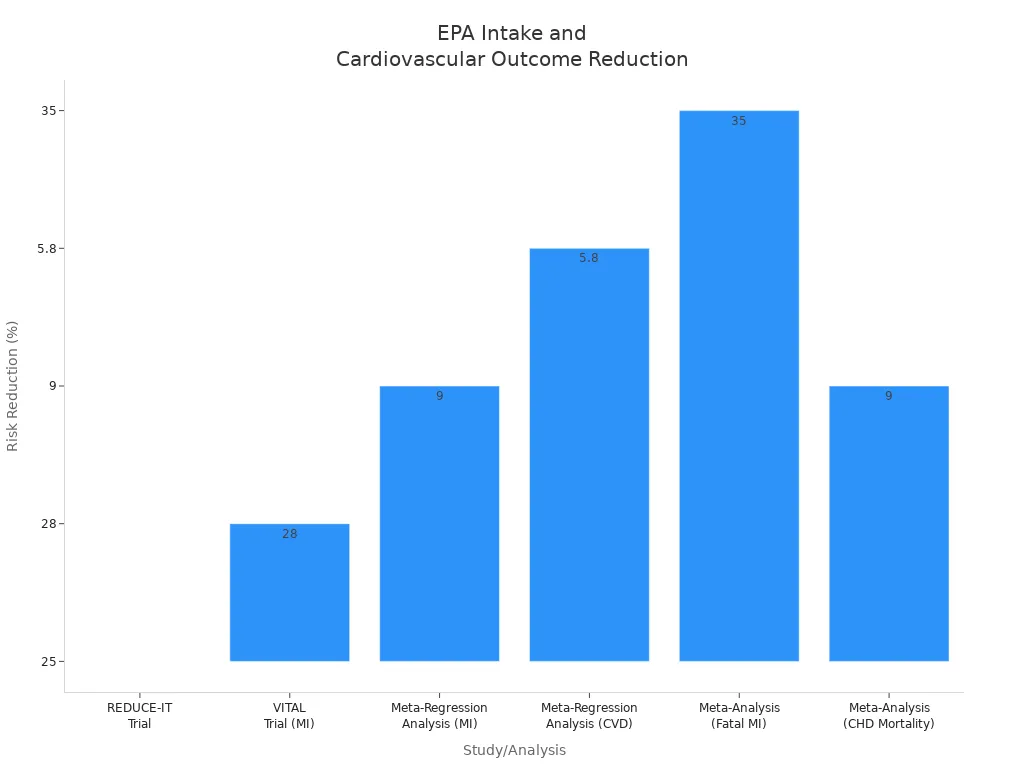
Eicosapentaenoic acid works by reducing inflammation, improving blood vessel function, and lowering triglycerides. These actions help keep your arteries healthy and support your overall well-being.
If you want to support your heart and get the benefits of EPA, consider adding a trusted omega-3 supplement to your daily routine. You can find a recommended option here.
DHA
Sources
Fish and Seafood
You find DHA in fatty fish such as salmon, tuna, herring, and mackerel. These fish provide the richest dietary sources of docosahexaenoic acid, but most people consume only about 63 mg of DHA per day from food. This amount falls short of recommended levels for optimal health. Eating fish twice a week helps, but you may still need more DHA to reach the omega-3 index that supports heart and brain health. Fish and seafood remain the most reliable natural sources, yet low intake means many people do not get enough docosahexaenoic acid.
Algal Oil
Algal oil offers a plant-based alternative for boosting DHA levels. You can choose algal oil supplements if you follow a vegetarian or vegan diet. These supplements deliver DHA in forms such as triglyceride (TAG), re-esterified triglyceride (rTAG), or ethyl ester (EE). TAG and rTAG forms have higher bioavailability, so your body absorbs more docosahexaenoic acid. Clinical studies show that DHA supplements, especially in TAG or rTAG forms, raise your omega-3 index more effectively than diet alone. Fortified foods like DHA-enriched margarine also help increase your intake. If you want to reach optimal DHA concentrations, supplements and fortified foods are often necessary.
Tip: If you want to support your brain, eyes, and overall health, consider adding a high-quality DHA supplement to your routine. Shop trusted DHA supplements here 🐟
Benefits
Brain Health
DHA is the most abundant polyunsaturated fatty acid in your brain. You need docosahexaenoic acid for neurogenesis, synaptogenesis, and maintaining neural membrane fluidity. These processes support learning, memory, and overall cognitive function. Meta-analyses of randomized controlled trials show that DHA supplementation improves cognition in people with mild cognitive impairment or age-related decline. For example, a clinical trial with healthy older adults found that taking 900 mg of DHA daily for 24 weeks improved learning and memory. Plasma DHA levels doubled, and participants made fewer errors on memory tests. These results highlight the importance of DHA for brain health as you age.
Eye Health
DHA is highly concentrated in retinal photoreceptors, the cells responsible for vision. Healthy levels of docosahexaenoic acid in your retina protect against damage from oxidative stress and bright light. Maternal DHA intake during pregnancy increases fetal DHA levels, supporting early visual system development. Prenatal DHA supplementation improves visual acuity in infants, and higher infant DHA status at birth correlates with better visual function. Clinical studies show that DHA supplementation can slow vision loss in retinal diseases and reduce the risk of age-related macular degeneration. DHA acts in an antiapoptotic manner, preserving retinal structure and function throughout life.
Fetal Development
You need DHA for normal brain and eye development in babies, especially during the last trimester of pregnancy and early childhood. Maternal DHA transfers to the fetus during pregnancy and through breast milk after birth. Preterm babies have higher DHA needs because they miss out on the third trimester, when DHA accumulates in the brain and retina. Studies show that maternal DHA supplementation improves infant problem-solving ability, visual attention, and cognitive outcomes. Supplementation also increases DHA levels in maternal and infant tissues, supporting neurological and visual development. Although some studies show variable long-term benefits, most research highlights the critical role of DHA in fetal development and early life health.
Note: If you are pregnant or planning to become pregnant, talk to your healthcare provider about DHA supplementation to support your baby’s brain and eye development.
ALA
Alpha-linolenic acid, or ALA, is the main plant-based omega-3 fatty acid. You find it in many foods, especially if you follow a vegetarian or vegan diet. Your body cannot make ALA, so you need to get it from your meals or supplements.
Sources
Plant-Based
You can boost your ALA intake by eating a variety of plant foods. Flaxseed, walnuts, hemp seeds, and chia seeds are the richest sources. Oils from flax, hemp, and chia seeds give you high amounts of ALA, but you should use them unheated to keep their benefits. Leafy greens, legumes, soybeans, and tofu also contain ALA, though in smaller amounts.
Here is a table showing typical ALA content in common plant-based foods:
Plant-Based Source | Typical ALA Content |
|---|---|
Walnuts | 2.6 g ALA per 28 g (1/4 cup) |
Flaxseed Oil (cold-pressed) | 8 g ALA per 14 g (1 tablespoon) |
Flaxseeds | High ALA content (seed form) |
Hemp Seeds | Good source of ALA |
Chia Seeds | Good source of ALA |
Leafy Greens | Contains ALA |
Legumes | Contains ALA |
Soybeans and Tofu | Contains ALA |
You can rely on these foods to meet your daily needs for alpha-linolenic acid. Many people who avoid fish or seafood choose these sources to support their heart and overall health.
Supplements
If you do not eat enough ALA-rich foods, you can use supplements to fill the gap. Flaxseed oil capsules and chia seed oil supplements are popular choices. These products help you reach your omega-3 goals, especially if you follow a plant-based diet. Always check the label for ALA content to make sure you get the right amount.
Tip: Choose cold-pressed oils and high-quality supplements to preserve ALA and maximize absorption.
Benefits
Cardiovascular
ALA supports your heart in several ways. Large studies in the US and Europe show that people who eat more ALA have lower risks of heart disease, heart attacks, and stroke. Some research found that each extra gram of ALA per day links to a 10% drop in heart disease death. The Lyon Diet Heart Study showed that a Mediterranean diet with about 1 gram of ALA daily reduced cardiac death and nonfatal heart attacks by over 60%. While some results are mixed, most evidence points to ALA as a heart-friendly nutrient.
Observational studies report lower risks of coronary heart disease and stroke with higher ALA intake.
Meta-analyses support a link between ALA and fewer nonfatal heart events.
Clinical trials show that ALA supplements can raise blood levels of ALA and EPA, though effects on cholesterol and inflammation vary.
Antioxidant
ALA acts as an antioxidant in your body. It helps fight oxidative stress by scavenging free radicals and recycling other antioxidants. Research shows that ALA can lower levels of malondialdehyde (MDA), a marker of lipid peroxidation and cell damage. Some studies report higher antioxidant enzyme activity after ALA supplementation, but results differ based on dose and population. You may see the most benefit at doses below 800 mg per day.
Note: ALA may also help your heart by improving blood vessel function and reducing atherosclerosis.
Conversion
To EPA
Your body can convert ALA to EPA, another important omega-3 fatty acid. This process depends on enzymes and varies from person to person. Women usually convert ALA to EPA better than men, likely because of estrogen. Most healthy adults convert about 5–10% of ALA to EPA, but some studies show even lower rates.
Conversion Efficiency (ALA to EPA+DHA) | Notes | |
|---|---|---|
Young adult males (USDA 1994) | ~12% combined EPA+DHA | 4% conversion to DHA alone; high individual variability |
Young adult women (UK study) | ~9% conversion to DHA | No detectable DHA formation in men; higher conversion in women possibly due to estrogen |
Later studies (Pawlosky et al. 2001, Hussein et al. 2005) | <0.4% combined EPA+DHA | Longer study duration; very low conversion rates |
Individual variability | High | Some individuals have extremely low conversion capacity |
Hormonal influence | Significant | Estrogen and hormonal status affect conversion efficiency |
Beta-oxidation rate | Lower in women | May contribute to higher conversion efficiency in females |
To DHA
Conversion of ALA to DHA is even less efficient. Most adults convert less than 5% of ALA to DHA, and some studies suggest rates as low as 1%. Women may convert slightly more, but the process slows down after menopause. If you rely only on ALA for your omega-3 needs, you may not get enough DHA for optimal brain and eye health.
If you want to support your heart, brain, and overall health, consider adding a trusted omega-3 supplement to your routine. 🥗 Find high-quality options here
EPA, DHA, ALA Comparison
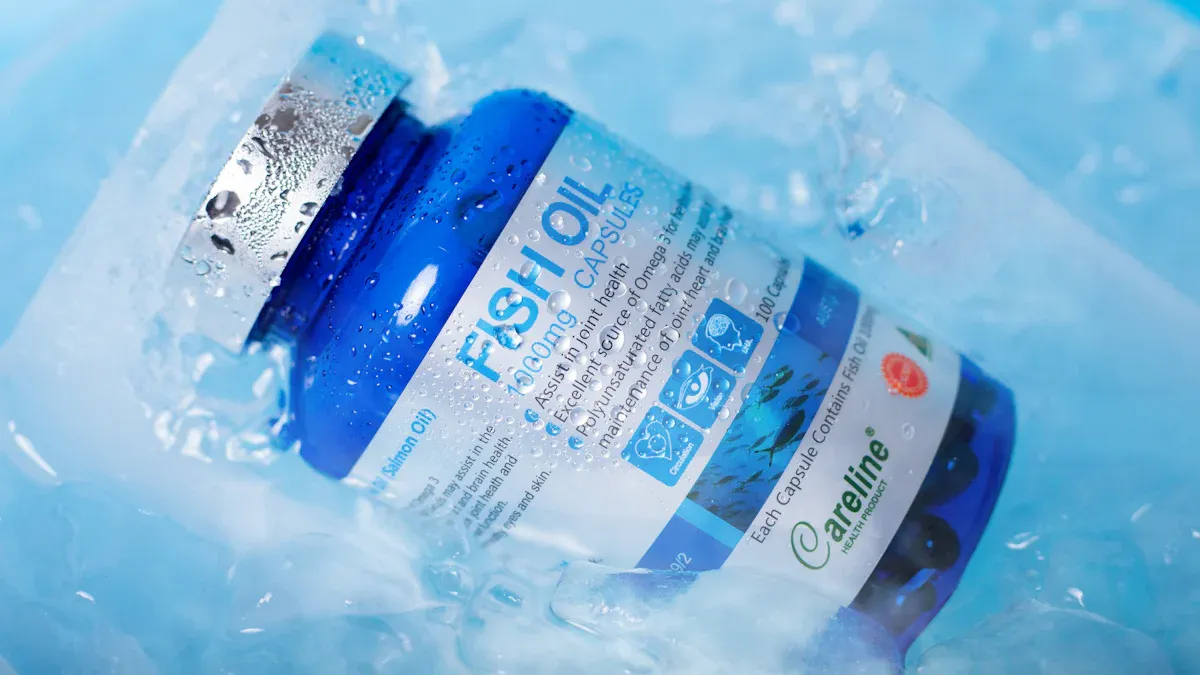
Bioavailability
You absorb omega-3 fatty acids in different ways, depending on their source and chemical form. EPA and DHA from marine sources, such as fish oil, krill oil, and algal oil, enter your bloodstream more efficiently than ALA from plants. The molecular form also matters. Triglycerides (TAG), phospholipids (PL), and ethyl esters (EE) each have unique absorption rates. Krill oil, which contains omega-3 as phospholipids, shows higher bioavailability than standard fish oil. Algal oil, often used for DHA, matches fish oil in absorption and works well for people who do not eat fish.
Here is a table comparing the bioavailability of omega-3 fatty acids from different sources:
Source Type | Molecular Form | Bioavailability Ranking (Chemical Forms) | Key Findings on Absorption and Long-term Bioavailability |
|---|---|---|---|
Fish Oil | Triglycerides (TAG) | NEFA > PL > rTAG > unmodified TAG > ethyl esters | Acute absorption differences noted; chronic supplementation shows similar long-term effects. |
Algae-based Omega-3 | Triglycerides (TAG) | Comparable to fish oil | Algal DHA bioavailability sufficient for both fish and non-fish eaters; viable alternative. |
Krill Oil | Phospholipids (PL) | Higher bioavailability than TAG forms | Enhanced absorption due to phospholipid form. |
You get the most benefit when you consume EPA and DHA directly from marine sources or supplements. ALA, found in flaxseed, walnuts, and chia seeds, absorbs well but does not convert efficiently to long chain omega-3 forms. This limits its impact on your health, especially for your brain and heart.
Tip: If you want to maximize the benefits of omega-3 fatty acids, choose supplements that provide EPA and DHA in highly bioavailable forms. Find a trusted option here 🐟
Conversion Rates
Your body can convert ALA, a plant-based omega-3, into EPA and DHA, but this process is slow and inefficient. Most people convert less than 10% of ALA to EPA and only about 1–5% to DHA. Women under 50 may convert slightly more, likely due to estrogen, but the rates remain low for everyone. Genetic factors, such as differences in enzyme activity, also affect how well you convert ALA to long chain omega-3 fatty acids.
Fatty Acid | Source Type | Conversion/Bioavailability Details | Notes on Metabolism and Absorption |
|---|---|---|---|
ALA | Plant oils (flaxseed, canola, walnut) | Conversion to EPA ~8%, to DHA ~1% in liver; poor conversion overall. Absorbed as triglycerides in small intestine. | Competes with linoleic acid metabolism; increases plasma ALA and EPA but minimal effect on DHA levels. |
EPA | Marine sources (fish oil, algae) | Directly bioavailable; key role in cardiovascular and anti-inflammatory benefits. | Higher biological activity than ALA; essential for eicosanoid synthesis. |
DHA | Marine sources (fish oil, algae) | Directly bioavailable; larger plasma pool than EPA; slow turnover. | Critical for neural and retinal function; limited increase from ALA conversion. |
You see the impact of these conversion rates in your blood levels. High-dose flaxseed oil raises ALA and EPA in your plasma, but it does not boost DHA much. For vegans and vegetarians, experts recommend 2–4 grams of ALA per day and 100–300 mg of DHA per day to meet your needs, since plant-based sources alone may not provide enough long chain omega-3.
Aspect | Details | Notes |
|---|---|---|
ALA Conversion Rates | Conversion influenced by competition with n-6 fatty acids and enzyme activity. | |
Gender Differences | Females under 50 may have higher conversion rates due to estrogen and adipose tissue effects | Observed increases in omega-3 index (O3I) in some female supplementation studies. |
Supplementation Outcomes | High-dose flaxseed oil increases plasma ALA and EPA but not DHA; low-dose may slightly increase O3I | Dietary intake of EPA and DHA preferred; plant-based sources alone may be insufficient. |
Recommendations for Vegans | 2–4 g ALA/day and 100–300 mg DHA/day recommended due to limited endogenous conversion | Highlights need for direct DHA supplementation in non-fish eaters. |
Effectiveness
EPA and DHA, the main long chain omega-3 fatty acids from marine sources, show the strongest effects for your heart, brain, and inflammation control. Clinical trials and meta-analyses reveal that EPA alone reduces cardiovascular mortality, heart attacks, and major cardiac events more than EPA and DHA combined. However, EPA monotherapy may increase the risk of atrial fibrillation and bleeding. DHA, while less studied alone for heart outcomes, improves inflammation markers and blood lipids more than EPA in some trials. ALA, the plant-based omega-3, supports heart health but does not match the potency of EPA and DHA due to poor conversion.
Supplement Type | Cardiovascular Mortality | Non-fatal Myocardial Infarction | Coronary Heart Disease Events | Major Adverse Cardiovascular Events (MACE) | Revascularization | Atrial Fibrillation Risk | Bleeding Risk |
|---|---|---|---|---|---|---|---|
EPA Monotherapy | Significant reduction (RR ~0.72) | Significant reduction (RR ~0.73) | Significant reduction | Significant reduction | Increased risk (RR ~1.35) | Increased risk (RR ~1.49) | |
EPA + DHA Combination | Moderate reduction (RR ~0.94) | Moderate reduction (RR ~0.92) | Moderate reduction (RR ~0.94) | Moderate reduction | Moderate reduction | Increased risk (less than EPA alone) | Not clearly increased |
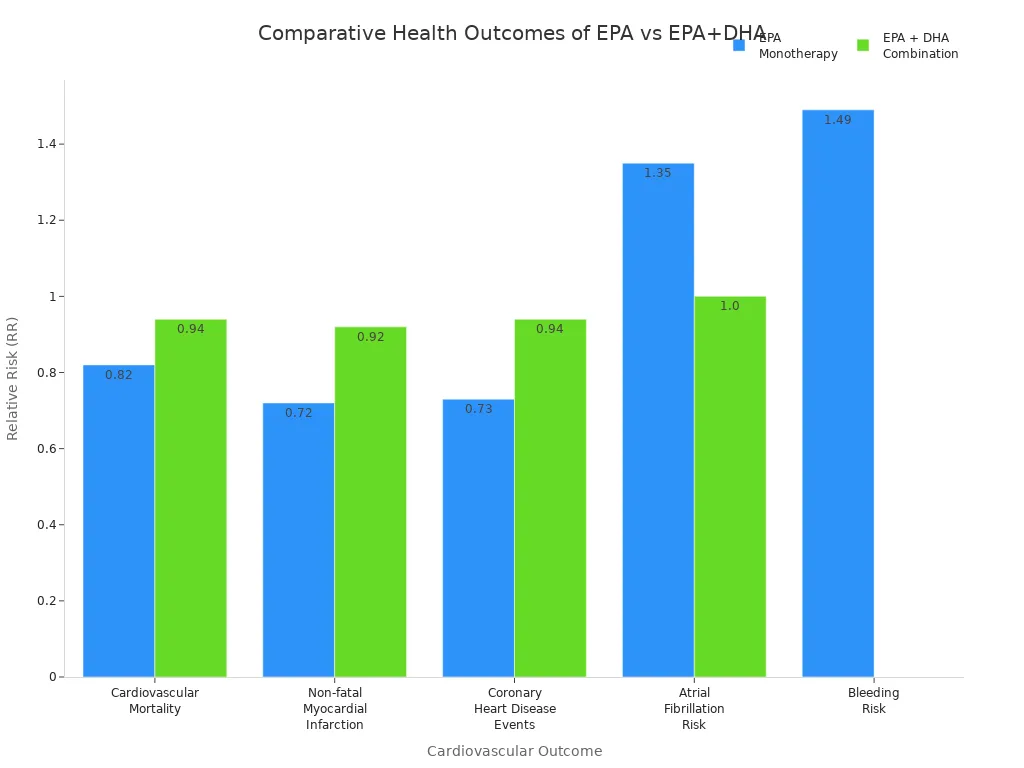
You also see differences in effectiveness for other health conditions:
Health Condition | EPA Effectiveness | DHA Effectiveness | ALA Effectiveness |
|---|---|---|---|
Cardiovascular Disease | EPA alone reduces cardiac events; high-dose EPA+DHA reduces events and promotes plaque regression. | DHA adds to cardiovascular benefits as a precursor to specialized proresolving mediators. | ALA raises EPA and DPA but has limited direct cardiovascular benefits. |
Cognitive Decline | EPA alone shows less impact on cognition; EPA+DHA improves cognitive function. | DHA is critical for brain health and supports memory and learning. | ALA has limited effect on cognitive function. |
Inflammation | EPA is a precursor to anti-inflammatory molecules (resolvins). | DHA helps resolve chronic inflammation through maresins. | ALA has limited direct anti-inflammatory effects. |
You benefit most from EPA and DHA for heart and brain support. ALA helps, but only as a backup source. Your genes, age, and diet all affect how well you use these omega-3 fatty acids. If you want the strongest impact, choose supplements with EPA and DHA. These forms deliver proven results for cardiovascular and cognitive health.
For the best results, select a high-quality omega-3 supplement that provides both EPA and DHA. This supports your heart, brain, and overall well-being. Explore top-rated options here 🐟
Omega-3 Supplements
Label Reading
When you shop for omega-3 supplements, you need to read the label carefully. Many omega-3 products display large numbers on the front, but these often refer to total oil or total omega-3 content, not the actual amounts of EPA and DHA. You should focus on the supplement facts panel, which lists the specific amounts of EPA and DHA per serving in milligrams. This helps you understand exactly how much of each omega-3 you get.
You also need to check the source and form of the omega-3. Fish oil, krill oil, and algal oil provide EPA and DHA, while plant oils like flaxseed supply ALA. Remember, your body converts ALA to EPA and DHA very poorly. Look for omega-3 fatty acid products that list EPA and DHA in absolute weights, not percentages. Serving size matters too. Make sure you follow the directions for use to get the expected intake.
Tip: Do not rely on the total omega-3 or total oil amount. Always check the actual EPA and DHA content per serving.
Here is a checklist to help you interpret omega-3 supplement labels:
Find the specific amounts of EPA and DHA per serving (in mg).
Note the source: fish oil, krill oil, algal oil, or plant oil.
Check the form: triglyceride, phospholipid, or ethyl ester.
Look for ALA content if you choose plant-based supplements.
Compare serving size and directions for use.
Be aware that front-of-package claims may exaggerate total omega-3 content.
Regulatory standards require that omega-3 supplements contain at least 90% of the claimed EPA and DHA content. This ensures you receive a reliable amount of these fatty acids. In the European Union, labels must express omega-3 content in milligrams or grams, not percentages or volume. Health claims are strictly regulated and must be scientifically supported.
Aspect | USA (FDA) | EU (European Commission, EFSA) | China (CFDA) |
|---|---|---|---|
Regulatory Agency | Food and Drug Administration (FDA) | European Commission and EFSA | China Food and Drug Administration (CFDA) |
Key Regulations | DSHEA, FD&C Act, NLEA, CGMP | Directive 2002/46/EC, Regulation (EC) No. 1924/2006 | Health Food Registration and Filing Regulation, GB 16740-2014 |
Compliance Process | Manufacturer/distributor responsibility | Notification/registration | Registration or filing depending on ingredient status |
GMP Required | Yes | Yes (HACCP) | Yes |
Labeling and Packaging | Required | Required | Required |
Health Claims | Not pre-approved; must not imply disease treatment | Strictly regulated; only authorized claims allowed | Strictly regulated; only authorized claims allowed |
Dosage
You need to know how much omega-3 to take for your health goals. Health authorities recommend different dosages based on age, health condition, and life stage. For general adults, 250–500 mg of EPA and DHA per day supports heart health. If you have cardiovascular disease, you may need about 1,000 mg daily. People with high triglycerides sometimes take up to 4,000 mg per day under medical supervision. Pregnant and lactating women should add 100–200 mg of DHA daily to support fetal and infant brain development. Older adults benefit from 1,000 mg per day to reduce autoimmune disease risk.
Group/Condition | Recommended Daily Dosage (EPA + DHA unless otherwise noted) |
|---|---|
General Adults | 250–500 mg per day for general health and cardiovascular risk reduction |
Cardiovascular Disease | About 1,000 mg (1 g) per day recommended for coronary heart disease patients |
Hypertriglyceridemia | Up to 4,000 mg (4 g) per day under medical supervision |
Pregnant and Lactating Women | Additional 100–200 mg DHA per day to support fetal and infant brain development |
Older Adults | 1,000 mg per day shown to reduce autoimmune disease risk and is well tolerated |
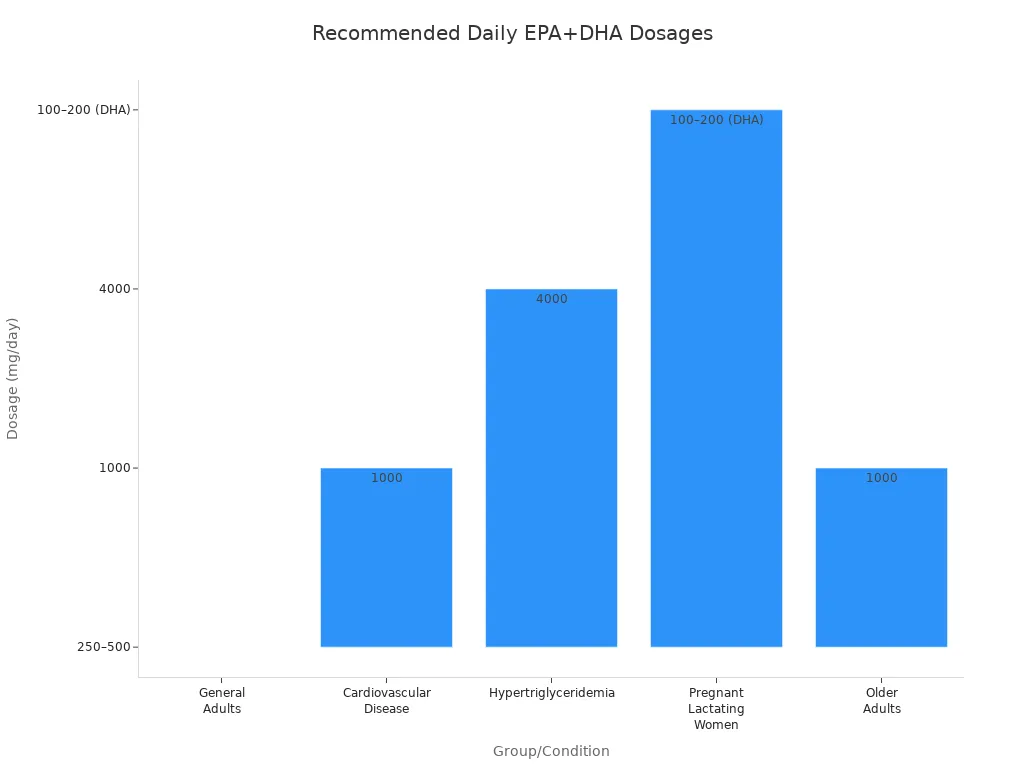
For ALA, the National Institutes of Health recommends:
Age Group | Male (ALA) | Female (ALA) | Pregnant (ALA) | Lactating (ALA) |
|---|---|---|---|---|
18 years and older | 1,600 mg | 1,100 mg | 1,400 mg | 1,300 mg |
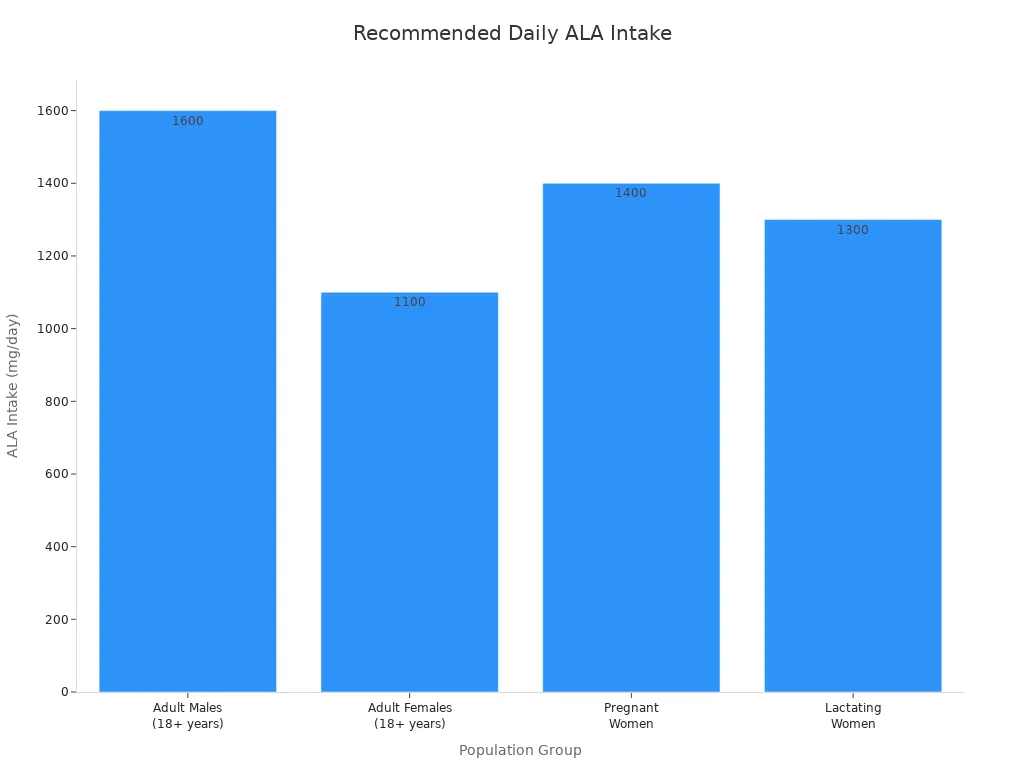
Children and adolescents also need omega-3 supplements for growth and development. Recommended dosages are:
Age Group | Recommended EPA+DHA Dosage per Day |
|---|---|
Children (4-12) | 2,000 mg |
Adolescents (13-18) | 2,000–3,000 mg |
Adults (18+) | 3,000–4,000 mg |
You can safely take up to 5,000 mg of omega-3 per day, according to FDA and EFSA guidelines. Most people see benefits at 1,240 mg of EPA and DHA daily.
Quality
You want to choose high-quality omega-3 supplements to get the best results. Not all omega-3 products are equal. You should look for several key criteria when you evaluate omega-3 fatty acid products:
EPA and DHA Content: Check that the supplement lists clear amounts of EPA and DHA per serving. These numbers determine potency and effectiveness.
Freshness and Oxidation: Choose products tested for oxidation markers. Look for packaging that blocks light and air. Antioxidants like vitamin E help prevent rancidity.
Purity and Safety: Select supplements tested for heavy metals, PCBs, dioxins, and microbial contamination. Third-party or ISO-accredited labs provide reliable results.
Third-Party Certifications: Look for seals from IFOS, GOED, NSF International, USP, or MSC. These verify potency, purity, freshness, and sustainability.
Manufacturing Standards: Pick products made in GMP-certified facilities for consistent quality and safety.
Molecular Form: Prefer omega-3s in triglyceride or reformed triglyceride forms. These absorb better than ethyl esters.
Sustainability: Choose supplements with MSC or Environmental Defense Fund certification for ethical sourcing.
Label Accuracy: Make sure the supplement matches its label claims. Third-party testing helps confirm this.
Sensory Checks: Avoid fish oils with a strong fishy smell or taste. This signals oxidation and poor quality.
Allergen Information: Check for allergen labeling and cross-contamination prevention.
Note: Omega-3 supplements are perishable. Buy only what you can use before the expiration date.
You can trust omega-3 supplementation when you select products that meet these standards. High-quality omega-3 supplements deliver the health benefits you expect.
If you want to support your heart, brain, and overall health, consider choosing a top-rated omega-3 supplement. Many consumers prefer products that meet strict quality and purity standards. Explore a trusted option here: https://amzn.to/41N8e4a 🐟
Omega-3 Sources
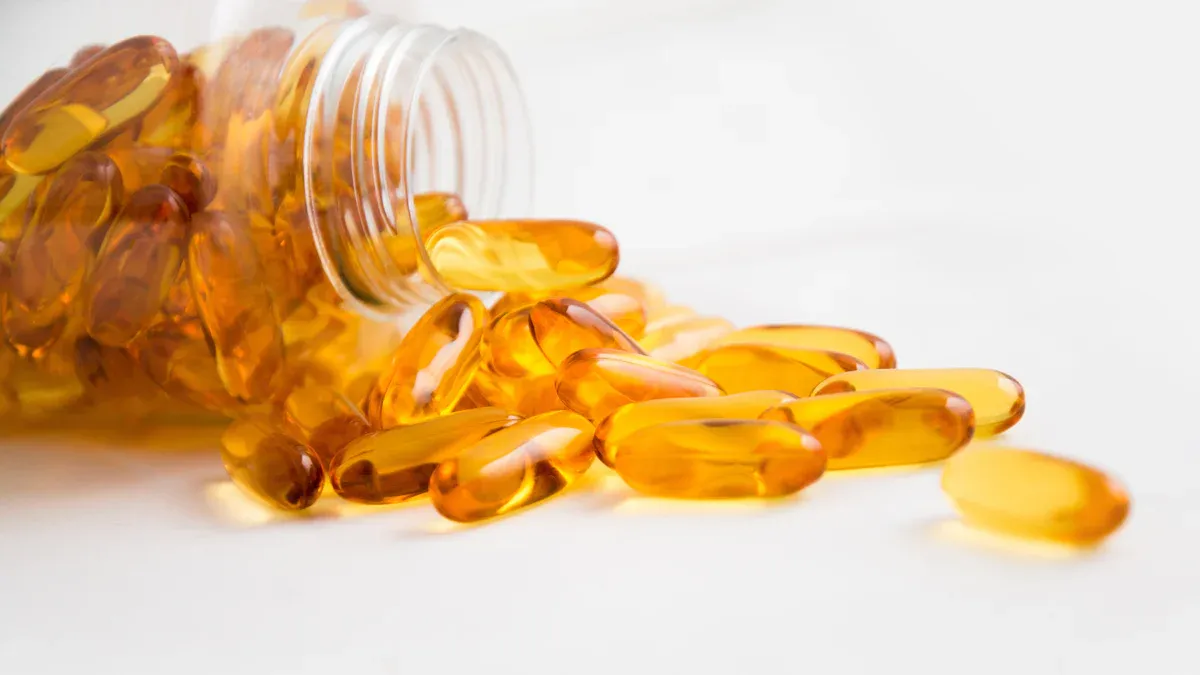
Marine vs Plant-Based
You can choose between marine and plant-based sources when looking for omega-3s. Marine sources, such as fatty fish and seafood, give you preformed EPA and DHA. Your body absorbs these long-chain omega-3 fatty acids easily, and they provide proven benefits for your heart and brain. Plant-based sources, like flaxseed, chia seeds, and walnuts, mainly supply ALA. Your body must convert ALA into EPA and DHA, but this process is slow and inefficient. Genetics, your diet, and high omega-6 intake can make this conversion even less effective. Studies show that even large amounts of ALA from plant oils do not raise your omega-3 index as much as marine sources do. Vegetarians and vegans often have lower blood levels of EPA and DHA because of this limited conversion. Health experts recommend marine sources for their higher bioavailability and stronger health effects.
Tip: If you follow a plant-based diet, consider adding a direct source of EPA and DHA to help meet your needs.
Algal Oil
Algal oil stands out as a sustainable and effective alternative to fish oil. Algae naturally produce EPA and DHA, so algal oil contains these long-chain omega-3s in forms your body can use. You get several advantages with algal oil:
Algal oil production does not depend on fish stocks and can occur on non-arable land, making it eco-friendly.
The EPA and DHA in algal oil have similar structures and absorption rates as those in fish oil.
Clinical trials show that DHA from algal oil raises blood DHA levels as well as, or even better than, fish oil.
Algal oil carries a lower risk of contaminants like heavy metals and PCBs.
New technologies help keep algal oil supplements fresh and stable.
Algal oil works well for vegetarians, vegans, and anyone who avoids fish.
You can rely on algal oil to support your omega-3 fatty acids intake without harming the environment. Many people choose algal oil for its purity, safety, and effectiveness.
Omega-3-6-9 Blends
Some supplements combine omega-3, omega-6, and omega-9 fatty acids. These blends use different oils, so the ratios of each fatty acid can vary a lot. Most Western diets already contain too much omega-6 compared to omega-3, with a typical ratio of 15:1 or higher. This imbalance links to higher risks of heart disease, inflammation, and other health problems. Experts suggest aiming for a ratio closer to 3:1 or 4:1 for better health. Lower ratios, such as 2–3:1, may help reduce inflammation and disease risk. Because supplement blends differ, always check the label to see the actual amounts of each fatty acid. Keeping a balanced ratio is key to getting the most benefit from these products.
Note: Personalized advice and regular monitoring can help you find the right balance of omega-3, omega-6, and omega-9 in your diet and supplements.
If you want a convenient way to boost your omega-3 fatty acids intake, consider a high-quality supplement that fits your needs. 🐟 Explore a trusted option here.
Myths
Diet vs Supplements
You may wonder if eating omega-3 rich foods or taking supplements gives you better health results. Many people believe that supplements work just as well as eating fish or plant-based sources. However, large scientific reviews show a different story. The Agency for Healthcare Research and Quality reviewed over 60 clinical trials and found that omega-3 supplements do not lower the risk of heart attacks, sudden cardiac death, or overall mortality. These studies showed mixed effects on cholesterol, but no real impact on major heart outcomes. Experts now recommend that you focus on a balanced diet with omega-3 rich foods instead of relying only on supplements.
A meta-analysis from the American Heart Association looked at more than 60,000 people. It found that omega-3s may protect against vascular death, but the benefits are smaller than once believed. Most studies tested supplements, not dietary fish. Only a few trials looked at what happens when you eat more fish. Another large review by Cochrane combined data from over 112,000 participants. It found little or no benefit from omega-3 supplements for heart disease, stroke, or death. Eating oily fish is healthy, but the evidence for its protective effect remains limited. Plant-based omega-3s like ALA may offer small heart benefits, but the effect is modest. You get the most from omega-3s when you include them as part of a healthy diet.
All Supplements Equal
You might think all omega-3 supplements work the same way, but this is not true. Over-the-counter (OTC) fish oil supplements and prescription omega-3 products differ in purity, potency, and regulation. The table below highlights these differences:
Feature | OTC Fish Oil Supplements | Pharmaceutical-Grade Fish Oil (e.g., Vascepa®) |
|---|---|---|
Purity | Variable; may contain contaminants | Highly purified, meets strict standards |
Potency | Inconsistent EPA/DHA concentration | Standardized EPA/DHA concentration |
Regulation | Food-grade (regulated as supplements) | Drug-grade (FDA-approved prescription) |
Clinical Evidence | Sparse or lacking rigorous trials | Supported by large randomized controlled trials |
Indications | General health claims, often unregulated | Approved for specific medical conditions |
Not all supplements provide the same health benefits. Some products have inconsistent EPA and DHA levels. Prescription omega-3s, like pure EPA, have strong evidence for heart health at specific doses. OTC supplements do not always meet these standards. Many people do not get enough omega-3s from food, so high-quality supplements can help. Always check for third-party testing and clear labeling.
Tip: Choose supplements with verified purity and potency to support your health goals.
Dosage Misconceptions
Many people believe that taking more omega-3 supplements always leads to better health. This is a common myth. Here are some key points to remember:
Omega-3 supplements are not the same as prescription products. The EPA and DHA content can vary widely.
Labels on dietary supplements may not match the actual amount of omega-3s inside.
Prescription omega-3s, like icosapent ethyl, show benefits at specific doses in clinical trials. These results do not apply to regular supplements.
Taking many capsules to match prescription doses can increase your intake of unwanted fats and calories.
Some supplements may contain contaminants or oxidation products, which can harm your health.
You should not self-adjust your omega-3 dose without talking to a healthcare provider.
For the best results, follow medical advice and choose products with proven quality. If you want a reliable omega-3 supplement, look for one that meets strict standards for purity and potency. 🐟 Support your health with a trusted omega-3 supplement.
You now understand the main differences between EPA, DHA, and ALA. EPA and DHA support your heart and brain, while ALA offers plant-based benefits but converts poorly. Choose omega-3 supplements that match your health goals and dietary habits. Always read labels for accurate EPA and DHA content. Consult your healthcare provider for advice tailored to your needs.
Ready to support your health? Explore trusted omega-3 supplements here 🐟
FAQ
What is the best time to take omega-3 supplements?
You can take omega-3 supplements with meals. This helps your body absorb the fatty acids better. Many people choose breakfast or dinner. Consistency matters more than the exact time.
Can you get enough omega-3 from food alone?
You can meet your needs by eating fatty fish twice a week. If you do not eat fish or seafood, you may need supplements or algal oil to reach recommended levels.
Are plant-based omega-3 supplements as effective as fish oil?
Plant-based supplements give you ALA, which your body converts poorly to EPA and DHA. Fish oil or algal oil provides EPA and DHA directly. These forms work better for heart and brain health.
How do you store omega-3 supplements?
Store your supplements in a cool, dry place. Keep the bottle tightly closed. Refrigeration helps prevent oxidation. Always check the expiration date before use.
Can omega-3 supplements cause side effects?
Most people tolerate omega-3 supplements well. Some may notice mild stomach upset, fishy aftertaste, or loose stools. Taking supplements with food can reduce these effects.
How do you choose a high-quality omega-3 supplement?
Look for third-party testing, clear EPA and DHA amounts, and freshness guarantees. Choose products with minimal fillers and no strong fishy odor. Certifications like IFOS or USP add extra trust.
Do omega-3 supplements interact with medications?
Omega-3s can thin your blood. If you take blood thinners or have bleeding disorders, talk to your doctor before starting supplements. Always check with your healthcare provider for safety.
Where can you find a trusted omega-3 supplement?
You can find high-quality omega-3 supplements online. Choose products with strong reviews and certifications. 🐟 Support your health with a trusted option here.
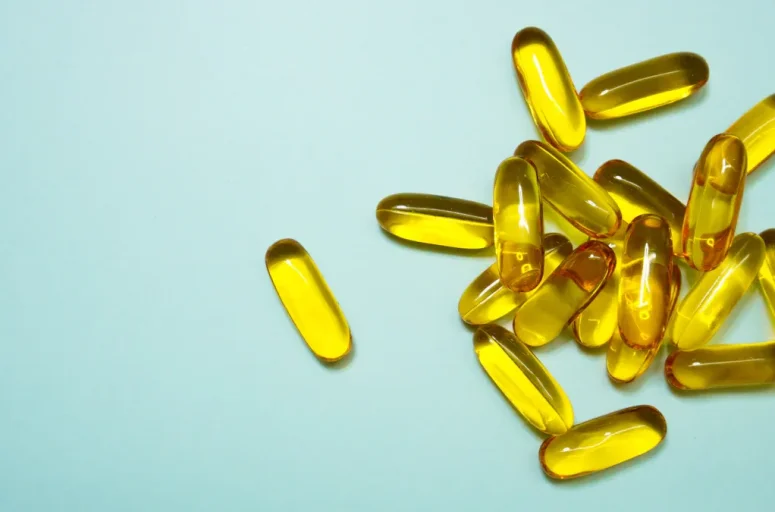


3 comments